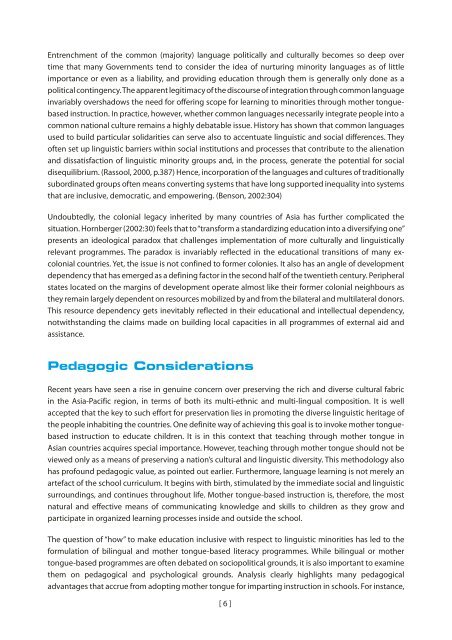Mother Tongue-based Literacy Programmes: Case Studies of Good ...
Mother Tongue-based Literacy Programmes: Case Studies of Good ...
Mother Tongue-based Literacy Programmes: Case Studies of Good ...
You also want an ePaper? Increase the reach of your titles
YUMPU automatically turns print PDFs into web optimized ePapers that Google loves.
Entrenchment <strong>of</strong> the common (majority) language politically and culturally becomes so deep overtime that many Governments tend to consider the idea <strong>of</strong> nurturing minority languages as <strong>of</strong> littleimportance or even as a liability, and providing education through them is generally only done as apolitical contingency. The apparent legitimacy <strong>of</strong> the discourse <strong>of</strong> integration through common languageinvariably overshadows the need for <strong>of</strong>fering scope for learning to minorities through mother tongue<strong>based</strong>instruction. In practice, however, whether common languages necessarily integrate people into acommon national culture remains a highly debatable issue. History has shown that common languagesused to build particular solidarities can serve also to accentuate linguistic and social differences. They<strong>of</strong>ten set up linguistic barriers within social institutions and processes that contribute to the alienationand dissatisfaction <strong>of</strong> linguistic minority groups and, in the process, generate the potential for socialdisequilibrium. (Rassool, 2000, p.387) Hence, incorporation <strong>of</strong> the languages and cultures <strong>of</strong> traditionallysubordinated groups <strong>of</strong>ten means converting systems that have long supported inequality into systemsthat are inclusive, democratic, and empowering. (Benson, 2002:304)Undoubtedly, the colonial legacy inherited by many countries <strong>of</strong> Asia has further complicated thesituation. Hornberger (2002:30) feels that to “transform a standardizing education into a diversifying one”presents an ideological paradox that challenges implementation <strong>of</strong> more culturally and linguisticallyrelevant programmes. The paradox is invariably reflected in the educational transitions <strong>of</strong> many excolonialcountries. Yet, the issue is not confined to former colonies. It also has an angle <strong>of</strong> developmentdependency that has emerged as a defining factor in the second half <strong>of</strong> the twentieth century. Peripheralstates located on the margins <strong>of</strong> development operate almost like their former colonial neighbours asthey remain largely dependent on resources mobilized by and from the bilateral and multilateral donors.This resource dependency gets inevitably reflected in their educational and intellectual dependency,notwithstanding the claims made on building local capacities in all programmes <strong>of</strong> external aid andassistance.Pedagogic ConsiderationsRecent years have seen a rise in genuine concern over preserving the rich and diverse cultural fabricin the Asia-Pacific region, in terms <strong>of</strong> both its multi-ethnic and multi-lingual composition. It is wellaccepted that the key to such effort for preservation lies in promoting the diverse linguistic heritage <strong>of</strong>the people inhabiting the countries. One definite way <strong>of</strong> achieving this goal is to invoke mother tongue<strong>based</strong>instruction to educate children. It is in this context that teaching through mother tongue inAsian countries acquires special importance. However, teaching through mother tongue should not beviewed only as a means <strong>of</strong> preserving a nation’s cultural and linguistic diversity. This methodology alsohas pr<strong>of</strong>ound pedagogic value, as pointed out earlier. Furthermore, language learning is not merely anartefact <strong>of</strong> the school curriculum. It begins with birth, stimulated by the immediate social and linguisticsurroundings, and continues throughout life. <strong>Mother</strong> tongue-<strong>based</strong> instruction is, therefore, the mostnatural and effective means <strong>of</strong> communicating knowledge and skills to children as they grow andparticipate in organized learning processes inside and outside the school.The question <strong>of</strong> “how” to make education inclusive with respect to linguistic minorities has led to theformulation <strong>of</strong> bilingual and mother tongue-<strong>based</strong> literacy programmes. While bilingual or mothertongue-<strong>based</strong> programmes are <strong>of</strong>ten debated on sociopolitical grounds, it is also important to examinethem on pedagogical and psychological grounds. Analysis clearly highlights many pedagogicaladvantages that accrue from adopting mother tongue for imparting instruction in schools. For instance,[6 ]

















